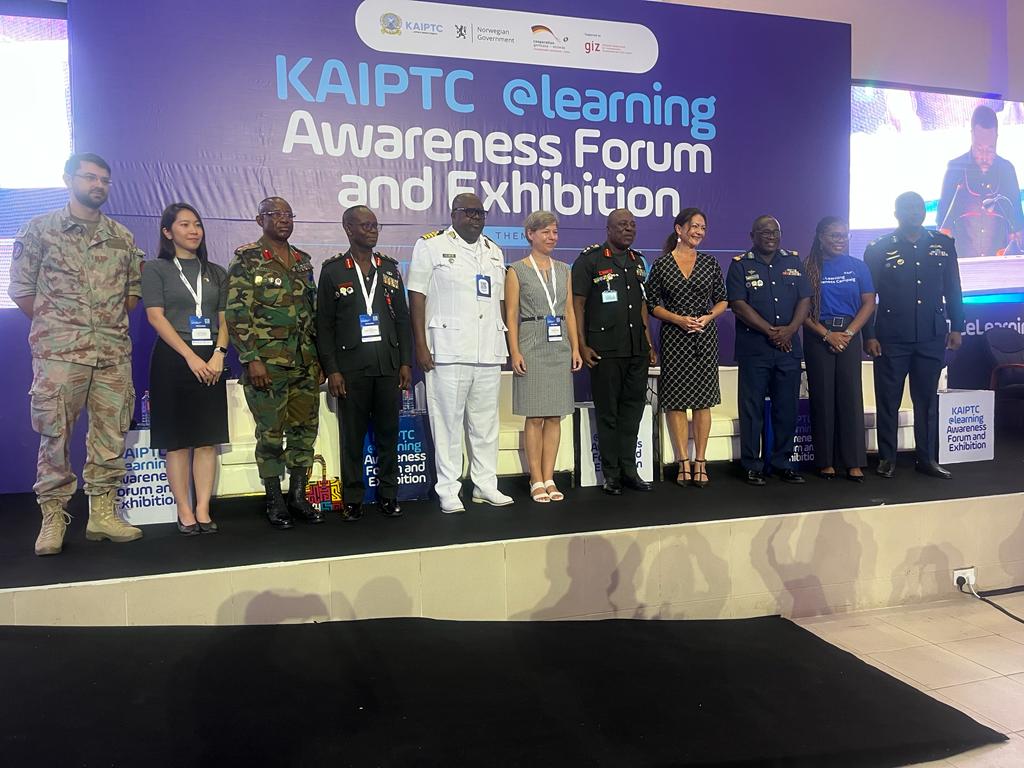The Kofi Annan International Peacekeeping Training Centre (KAIPTC) has initiated an e-learning awareness campaign designed to transform teaching and learning through innovative technology.
Supported by GIZ through the ECOWAS Peace and Security Architecture and Operations Project (EPSAO) and the Norwegian government, the campaign receives funding from the German Government with co-funding by the European Union.
Read also: BBincubator secures 3 million Dollars for first bilingual e-learning platform
Revolutionising Learning with Innovative Technology
The e-Learning Awareness Campaign adopts the theme: “The Future of KAIPTC Learning! Developing Capacities through Innovative Learning Technologies.” Over the last decade, online education and virtual learning have seen substantial growth and expansion, marking a transition from traditional education to the era of eLearning and self-directed learning enabled by information and communication technology.
Since the launch of KAIPTC’s first eLearning course in 2020, the e-learning platform has attracted over 3,000 participant enrollments across various available e-Courses. Major General Richard Addo Gyane, the Commandant of KAIPTC, highlighted that e-learning offers dynamic and practical methods of delivering training. This transition contributes to achieving strategic objectives, ensuring financial sustainability, and the continuity of the Centre’s post-graduate academic programs and other knowledge generation initiatives in peace and security.
Major General Gyane emphasised that today’s learners seek relevant, mobile, self-paced, and personalised content. This need is met by online learning modes that allow students to study at their convenience. In an age where technology permeates every aspect of life, learning has undergone a revolution.
Technology integration into education and professional development has ushered in an era of unparalleled opportunities and possibilities. From free access to knowledge to fostering personalised learning experiences, technology has ignited a digital renaissance in learning and development.
The Impact of COVID-19 on Educational Transformation
The Commandant acknowledged the profound shift in the education and training landscape triggered by the COVID-19 pandemic, which necessitated an accelerated adoption of digital technology in the academic and policy realms. This transformation prompted educational institutions like KAIPTC to pivot towards online teaching and training, making the most of technological resources at their disposal.
Mr. Dirk Assmann, Country Director, GIZ, underlined the evolving relationship and cooperation with KAIPTC in alignment with the Center’s vision and the ECOWAS Peace and Security Architecture. He noted that Germany’s and GIZ’s support for digitising the Centre dated back to the introduction of the Learning Management System (LMS) in 2014.
The growing demand for innovative virtual training approaches in the peace and security sector, along with KAIPTC’s desire to diversify its course portfolio, led the German cooperation to enhance its support for the Center’s eLearning development.
Experts introduce e-learning to boost agricultural productivity
The Role of Quality E-Learning
During a panel discussion, Professor Eric Appau Asante, the Director of e-learning at the Kwame Nkrumah University of Science and Technology (KNUST), emphasised the importance of quality e-learning approaches in achieving educational outcomes while enhancing the overall learning experience. Mr. Moyomola Bolarin, Chief Instructional Designer at the United Nations System Staff College (UNSSC), highlighted the significance of investing in high-speed and reliable internet access as a critical tool for effective e-learning. He stressed the need for integrating tools and features to foster interactivity and engagement to enhance e-learning experiences at the Centre.
KAIPTC’s E-Learning Awareness Campaign reflects a broader movement towards leveraging innovative technology to provide accessible and effective educational opportunities, fostering knowledge dissemination and skill development in the field of peace and security.




